Benefits of Membership
Membership of the Royal Society of New South Wales is open to any person interested in the promotion of studies in evidence-based debate on matters of significance to humanity. The Society upholds the principles of liberal democracy and encourages a non-discriminatory discourse and the free exchange of ideas that respect religious, political, and cultural freedoms, seeing these as fundamental to Australian intellectual life.
Society membership brings inclusion in networks of learned researchers and professionals across a wide range of disciplines, provides opportunities to advance the evolution of science and culture in Australia, and is an avenue through which individuals can share in the work of the Society.
The Society particularly welcomes young people to become members.
The Society offers:
- A monthly Bulletin to keep you up to date with what’s going on in the Society.
- Monthly lectures, in Sydney and at the Branches, presented by eminent researchers and practitioners, to inform you of the latest developments in their fields, and to address major challenges confronting contemporary society.
- Social events that bring bring members together.
- Specialist, prestigious lectures, such as the Clarke, Pollock, Poggendorf, and Liversidge lectures.
- Free online and subscription access to the printed version of the Society’s internationally-recognised peer-reviewed Journal, providing refereed reviews and other learned papers, together with written versions of our monthly lectures, PhD abstracts, and biographical memoirs.
- An annual dinner with a recognised speaker and an opportunity to mingle with our prestigious Award winners.
- Access to one of the oldest scientific libraries in the Southern Hemisphere.
Information about categories of membership, how to join the Society, and online services available to members are available through the preceding links.
Making SPACE for Australia — Royal Society of NSW and Four Academies Forum November 2019
Report by the Forum Convenors: Emeritus Professor Roy MacLeod FRSN and Dr Susan Pond AM FRSN
This year’s Royal Society of NSW and Four Academies Forum devoted to the subject of ‘Making Space for Australia’ drew together, in one day, authoritative voices from the natural, technological and social sciences and the humanities, to consider a range of issues that are likely to inform Australian public policy and public opinion in the decades ahead.
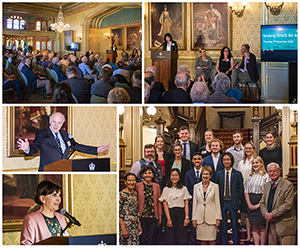 Held like the four previous Forums, under the gracious Vice Regal Patronage of the Governor of New South Wales and in the ballroom of Government House, Sydney, the inclusive gathering of 140 people represented the Royal Society of NSW, the four Learned Academies, and guests from a cross-section of the space community, including 13 undergraduate students from diverse Faculties across six universities and studying various aspects of space.
Held like the four previous Forums, under the gracious Vice Regal Patronage of the Governor of New South Wales and in the ballroom of Government House, Sydney, the inclusive gathering of 140 people represented the Royal Society of NSW, the four Learned Academies, and guests from a cross-section of the space community, including 13 undergraduate students from diverse Faculties across six universities and studying various aspects of space.
Her Excellency the Honourable Margaret Beazley AO, QC, Governor of NSW, reflected during her opening remarks on Australia’s long interest in reading the Heavens, beginning with the earliest Aboriginal observations and understanding of the constellations and their configurations.
Introduced by Professor Anne Green, Chair of the NSW Division of ATSE, the Keynote speaker, Professor Lisa Kewley, emphasized Australia’s strengths in space science while taking us on a tour of the Universe. The next session, Australia in the Space Age , moderated by Professor Jane Hall, President of the Academy of the Social Sciences, heard papers by the space historian and curator, Kerrie Dougherty on ‘Sixty Years of Australia in Space,’ by Dr Megan Clark (Director of the Australian Space Agency), on the Agency and its work; by Dr Kimberley Clayfield, on CSIRO’s ‘Roadmap for Space’; and by Dr Adam Lewis, of Geoscience Australia, on ‘Seeing and Sensing Australia from Space.’
Dr Donna Lawler, Principal of Azimuth Advisory, moderated the session devoted to Space Law, Security and Ethics. Prof Steven Freeland, the distinguished international Space lawyer, summarized the ‘Limits of Law’ in Space, and Dr Ben Piggott of UNSW Canberra reminded us of the military and geopolitical dimensions of Space policy. Dr Nikki Coleman, RAAF chaplain and Space ethicist, explored the ‘Ethical Challenges in Space: Norms and Conventions in Peaceful Spacefaring.’
A third session, expertly conducted by Ms Annie Handmer, historian of science of Sydney University, on Space and People , highlighted key themes in what is fast becoming the ‘humanities of Space’, with papers by Jonathan Webb, of the ABC, on the ‘Promise and Peril of Space’; by Dr Alice Gorman, of Flinders University, on ‘Space Heritage: Artefacts and Archaeology’ (both now challenged by the profusion of Space debris); a theme capped by the writer and novelist Ceridwen Dovey, on ‘Human Visions and Visitors in Space’.
The final session, Australia's Space Economy moderated by Dr Susan Pond AM, Chair of the NSW Smart Sensing Network, brought us back to Earth, welcoming William Barrett, Senior VP of Asia Pacific Space consultants, who addressed Australia’s promising Space Industry, then Paul Scully-Power, AM, one of Australia’s pioneering astronauts, speaking about the challenge presented by ‘Space 2.0: Small Space Satellite’s’. Finally, Group Captain Jason Lind, explained the role that Defence must and is playing in supporting Australia’s Space industry.
Our rapporteur, Dr Brett Biddington, AM, of Canberra, skillfully summarized the day. He reminded the audience that by a unique combination of history, science, and geography, Australia occupies an important place on the front line of continuing discoveries in Space. He noted the tension between the civil and the defence realms in space as well as an even bigger tension emerging between public and private investment in space.
Judging from the RSNSW’s customary post-conference Survey, the Forum met the challenges of the day, inciting a wide range of questions that continued long after the proceedings ended. At the same time, it foreshadowed a number of fresh questions that may well be asked by academics, governments, and the public at large and at future RSNSW events.
To paraphrase CP Snow, Australia has the future in its sights, and SPACE holds great prospects for the next generation. Bearing a distinguished 50-year history of Space engagement and blessed with major Space-related facilities across the country, Australia can play a far-reaching role in the coming years, not only in science and technology but also in law and ethics.
We are reminded, in celebrating this 50th year since Apollo 11, that the Astronauts left a plaque on the moon that said, ‘We came in peace for all Mankind’. The adventure that lies before us is one in which Australia accepts both the challenge and its responsibilities. We can only hope that this sentiment guides our destiny, our fullest achievement, and remains our uppermost goal.
Southern Highlands Branch — Home
About the Branch
The Society has a very active branch in the Southern Highlands. Regular monthly meetings are held which are well attended by both members and visitors.
Contact
For further information about the talks presented at the Southern Highlands Branch contact:
The Royal Society of NSW
Southern Highlands Branch
PO Box 1418
Bowral, NSW 2576
Email: This email address is being protected from spambots. You need JavaScript enabled to view it.
Details of past events held by the Southern Highlands branch can be found here.
Royal Society of NSW Awards for 2019
The Council of the Royal Society of New South Wales is pleased to announce its Awards for 2019. The award winners are listed below, with links to information about both the awards and their recipients:
- James Cook Medal — Scientia Professor Matthew England
- Clarke Medal — Professor Dietmar Müller
- Edgeworth David Medal — Professor Si Ming Man
- History and Philosophy of Science Medal — Professor Evelleen Richards
- Walter Burfitt Prize — Professor Kourosh Kalantar-Zadeh
- Royal Society of NSW Scholarships — Emma Austin, Shayam Balaji, Michael Papanicolaou, and Thomas Pettit
James Cook Medal — Scientia Professor Matthew England
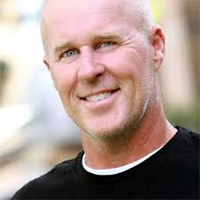 The James Cook Medal, the Society’s highest honour, is awarded from time to time for outstanding contributions to both science and human welfare, in and for the Southern Hemisphere.
The James Cook Medal, the Society’s highest honour, is awarded from time to time for outstanding contributions to both science and human welfare, in and for the Southern Hemisphere.
Professor Matthew England, of the UNSW Climate Change Research Centre, is recognised as one of the world’s foremost experts in how the world’s oceans control regional and global climate on time scales from seasons to millennia. His field of research spans physical oceanography and climate dynamics, where he has written seminal papers on Southern Ocean water-mass formation, Antarctic ocean-atmosphere-ice interactions, climate modes of variability, and ocean ventilation processes. Importantly, in the context of the James Cook Medal, England has a sustained track record of outstanding research and discovery in areas that make an impact on human welfare, both here in Australia and across other regions of the Southern Hemisphere, including improved predictions of rainfall and climate variability, discoveries of the oceanic drivers of severe drought and flooding rains, and quantification of the impacts of climate change and the fate of ocean pollution.
Clarke Medal — Professor Dietmar Müller
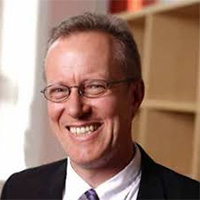 The Clarke Medal is awarded each year for distinguished research in the natural sciences, conducted in Australia and its territories, in the fields of botany, zoology, and geology (considered in rotation). For 2019, the medal was awarded in geology.
The Clarke Medal is awarded each year for distinguished research in the natural sciences, conducted in Australia and its territories, in the fields of botany, zoology, and geology (considered in rotation). For 2019, the medal was awarded in geology.
Professor Dietmar Müller, of the School of Geosciences at the University of Sydney, is internationally renowned for discoveries that have transformed our fundamental understanding of the Earth’s evolution, environments and geological resources. Many of these discoveries were made possible only through Müller’s international research efforts in building a Virtual Earth Laboratory to “see” deep into the Earth in four dimensions (space and time), opening up the Earth’s dynamic history going back 200 million years. His scientific discoveries are outstanding, with contributions to the field including age and tectonic evolution of the ocean basins, earthquake hazard mapping, Australia’s intraplate stress through time, sea floor image analysis, the evolutions of continental basins and margins, and linking plate tectonics and mantle convection to Australia’s surface topography through time.
Edgeworth David Medal — Professor Si Ming Man
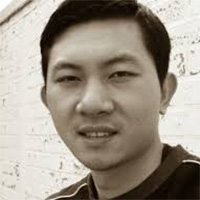 The Edgeworth David Medal is awarded annually for distinguished research by a young scientist under the age of 35 years for work undertaken mainly in Australia or contributing to the advancement of Australian science.
The Edgeworth David Medal is awarded annually for distinguished research by a young scientist under the age of 35 years for work undertaken mainly in Australia or contributing to the advancement of Australian science.
Professor Si Ming Man, of the John Curtin School of Medical Research at the Australian National University, is an outstanding young researcher in the field of innate immunology, attaining a full professorship only six years after his PhD graduation. Six of his recent papers are recognised as “highly cited”, being in the top 1% of the field. His research has identified a class of disease-fighting “killer” proteins, produced by the cell, which can directly attack bacteria, causing these pathogens to die and release signals that can rapidly trigger activation of the immune system. Further studies have shown that immune receptors have critical roles in preventing gut inflammation and the development of colorectal (bowel) cancer, while most recently he has discovered that toxins from foodborne bacteria can be detected and blockaded by immune receptors to prevent sepsis.
History and Philosophy of Science Medal — Professor Evelleen Richards
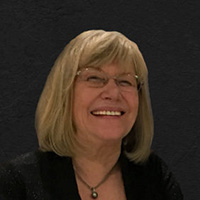 The Society’s History and Philosophy of Science Medal is awarded annually to recognise outstanding achievement in the History and Philosophy of Science.
The Society’s History and Philosophy of Science Medal is awarded annually to recognise outstanding achievement in the History and Philosophy of Science.
Professor Evelleen Richards, an Honorary Professor in the School of History and Philosophy of Science at the University of Sydney, is an Australian scholar of outstanding achievement and international standing. Her work is particularly notable in that she has made significant contributions to answering key questions in the history of science, especially in the history and historiography of evolutionary theory, as well as to the study of contemporary research policy in science and medicine. Her studies in the contextual history of evolutionary biology are internationally regarded as offering a major advance in the understanding and interpretation of the scientific past. Her recent book on the genesis and reception of Charles Darwin’s concept of sexual selection, “Darwin and the Making of Sexual Selection” has generated substantial international impact, being awarded the 2018 Suzanne J Levinson Prize of the US History of Science Society. Equally remarkable during her career has been her engagement with the history and socio-politics of medicine and their policy implications, demonstrating the importance of historical and sociological analyses in illuminating medical practices and policy, particularly in relation to clinical trials and drug regulation.
Walter Burfitt Prize — Professor Kourosh Kalantar-Zadeh
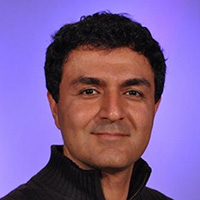 The Walter Burfitt Prize is awarded every three years to a resident of Australia or New Zealand for research in the pure or applied sciences that is deemed to be of the highest scientific merit, judged according to scientific output published during the preceding six years.
The Walter Burfitt Prize is awarded every three years to a resident of Australia or New Zealand for research in the pure or applied sciences that is deemed to be of the highest scientific merit, judged according to scientific output published during the preceding six years.
Professor Kourosh Kalantar-Zadeh, of the School of Chemical Engineering at UNSW Sydney, is renowned for his research and development in the areas of liquid metals, atomically thin materials and ingestible sensors. He is a prolific researcher, recognised in 2018 by Clarivate Analytics as a “Highly Cited Researcher”. Over the past six years, his contributions have been frequently first-in-world and have set the agenda for research fields internationally in areas such as two-dimensional (2D) materials, liquid metals and microfluidics, and point-of-care diagnostic systems and sensors.
Royal Society of New South Wales Scholarships
The Royal Society Scholarships, valued at $500, together with a complimentary year of associate membership of the Society, are awarded annually in order to acknowledge outstanding achievements by young researchers in any field of science. Applicants must be enrolled as research students in a university in either NSW or the ACT on 1 January in their year of nomination.
For 2019, the RSNSW Scholarships have been awarded to:
- Ms Emma Austin — The University of Newcastle
- Mr Shayam Balaji — The University of Sydney
- Mr Michael Papanicolaou — University of Technology Sydney and the Garvan Institute of Medical Research
- Mr Thomas Pettit — University of Technology Sydney.
Branches of the Royal Society of NSW
Current Branches
The Society currently has active branches in the:
The Role of Branches
The Society has a remit for the whole of the state of New South Wales. In order to achieve this it has established Branches in several major regional centres of the state over the years. Branches of the Society provide local opportunities for residents of the region to participate in events organised by the Branch. Each is run and managed by a local Committee of Fellows and Members of the Society. Branches can be established in any region where there are sufficient numbers of Members or Fellows willing to host regular meetings and its establishment is agreed upon by Council. Membership of a Branch does not involve any additional application fee or Membership subscription.
A long-standing, active branch at Mittagong/Bowral in the Southern Highlands was established in 1994, while new branches were established in the Hunter Region, based in Newcastle, in 2019, and in Western NSW in 2021. Regular meetings are held in each of these locations and are well attended by members and visitors alike. The Society ran a very successful New England Branch based in Armidale for many years until recently and has plans to revive it. A Central West Branch based in Orange has been active in the recent past.
Branches may frame Rules for the conduct of their own affairs within the framework of the Rules and By-laws of the Society. Any Branch Rules are subject to the approval of the Society’s Council. Branches are managed by a Branch Committee which consists of a Chairman, Vice-Chairman, Honorary Secretary, Honorary Treasurer and ordinary members of the Committee. One member of the Committee is selected by the Branch to be the Branch’s representative on the Society’s Council.
The Annual General Meetings of Branches are held each year in March (i.e., prior to the Society’s AGM in early April) at which a written report of the activities and finances of the Branch is presented and at which office-bearers are elected for the ensuing year. A copy of the written report is forwarded to the Society’s Council before 15 March each year.

